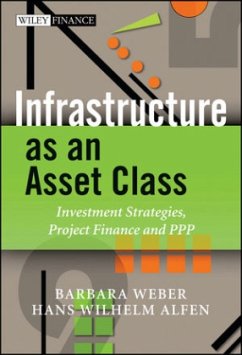The market for infrastructure is vast and, contrary to popular belief, the range of potential infrastructure investments is extremely broad. An investor who does not have a sufficient overview and insight into the infrastructure market or an awareness of the suitable investment opportunities and the risks they entail, will find it difficult to select the right investments.
This book is a comprehensive guide to the subject, bringing together the topics of infrastructure investments, project finance and public private partnerships (PPPs), equipping investors with the necessary theoretical knowledge and background information as well as practical examples in order to further their understanding of the key aspects of infrastructure investments.
It answers questions such as: How is infrastructure defined? Which sectors are classified as infrastructure, how are they categorised, and what are the differences between them? Is infrastructure an asset class in its own right? If so, what are its characteristics? What are the fundamental options for investing in infrastructure? What is a good starting point for institutional investors? How should infrastructure funds be evaluated? What risks do they entail and how can these risks be identified and assessed? How should they be structured in order to best allocate these risks?
The book discusses the differing objectives and expectations of the parties involved and the conditions required by public principals and investors in order to enable these groups to overcome the "language problems" they largely encounter.
In addition to background knowledge and information on the latest developments in the individual subject areas, the book also explains the methodology of project finance in detail, both for traditional project finance and in the PPP context, establishing the key differences to other forms of financing, guiding readers through the various phases of project analysis on a step-by-step basis using practical examples.
Well structured infrastructure investments can serve to improve the risk-return profile of an investor's overall portfolio on account of their long term and their low level of correlation with traditional asset classes. This book will assist investors in their understanding of infrastructure investments, leading to a better informed portfolio.
"A comprehensive and well-written overview of many relevant topics in the infrastructure sector; a useful guide for everyone involved or interested in the infrastructure area."
Henk Huizing, Head of Infrastructure, PGGM
"A comprehensive book that effectively marries the topics of infrastructure investing, project finance and PPPs as well as bridges the gap between the theoretical and the practical - the authors are to be commended on this work."
Marc S. Lipschultz, Global Head of Energy and Infrastructure, Kohlberg Kravis Roberts & Co.
"Quite a book and one that should definitely be part of the toolkit of those who are interested in the Infrastructure asset class. Had this comprehensive work been available ten years ago, no doubt, one or two of us certainly would have done things differently. So, let's keep it closely at hand as a guide for the future that helps us deliver even better outcomes for all stakeholders and enables us to further develop the asset class."
Ron Boots, Senior Portfolio Manager - Co head Infrastructure Investments, APG All Pensions Group
This book is a comprehensive guide to the subject, bringing together the topics of infrastructure investments, project finance and public private partnerships (PPPs), equipping investors with the necessary theoretical knowledge and background information as well as practical examples in order to further their understanding of the key aspects of infrastructure investments.
It answers questions such as: How is infrastructure defined? Which sectors are classified as infrastructure, how are they categorised, and what are the differences between them? Is infrastructure an asset class in its own right? If so, what are its characteristics? What are the fundamental options for investing in infrastructure? What is a good starting point for institutional investors? How should infrastructure funds be evaluated? What risks do they entail and how can these risks be identified and assessed? How should they be structured in order to best allocate these risks?
The book discusses the differing objectives and expectations of the parties involved and the conditions required by public principals and investors in order to enable these groups to overcome the "language problems" they largely encounter.
In addition to background knowledge and information on the latest developments in the individual subject areas, the book also explains the methodology of project finance in detail, both for traditional project finance and in the PPP context, establishing the key differences to other forms of financing, guiding readers through the various phases of project analysis on a step-by-step basis using practical examples.
Well structured infrastructure investments can serve to improve the risk-return profile of an investor's overall portfolio on account of their long term and their low level of correlation with traditional asset classes. This book will assist investors in their understanding of infrastructure investments, leading to a better informed portfolio.
"A comprehensive and well-written overview of many relevant topics in the infrastructure sector; a useful guide for everyone involved or interested in the infrastructure area."
Henk Huizing, Head of Infrastructure, PGGM
"A comprehensive book that effectively marries the topics of infrastructure investing, project finance and PPPs as well as bridges the gap between the theoretical and the practical - the authors are to be commended on this work."
Marc S. Lipschultz, Global Head of Energy and Infrastructure, Kohlberg Kravis Roberts & Co.
"Quite a book and one that should definitely be part of the toolkit of those who are interested in the Infrastructure asset class. Had this comprehensive work been available ten years ago, no doubt, one or two of us certainly would have done things differently. So, let's keep it closely at hand as a guide for the future that helps us deliver even better outcomes for all stakeholders and enables us to further develop the asset class."
Ron Boots, Senior Portfolio Manager - Co head Infrastructure Investments, APG All Pensions Group

